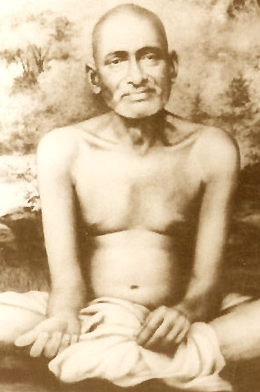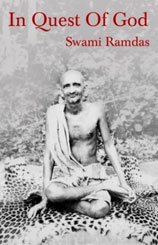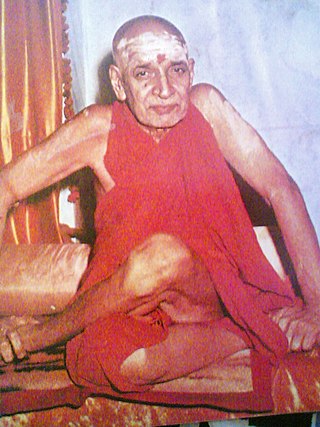
Dayanand Saraswati, was a Hindu philosopher, social leader and founder of the Arya Samaj, a reform movement of Hinduism. His book Satyarth Prakash has remained one of the influential texts on the philosophy of the Vedas and clarifications of various ideas and duties of human beings. He was the first to give the call for Swaraj as "India for Indians" in 1876, a call later taken up by Lokmanya Tilak. Denouncing the idolatry and ritualistic worship, he worked towards reviving Vedic ideologies. Subsequently, the philosopher and President of India, S. Radhakrishnan, called him one of the "makers of Modern India", as did Sri Aurobindo.
Contemporary groups, collectively termed Hindu reform movements, reform Hinduism, neo-Hinduism, or Hindu revivalism, strive to introduce regeneration and reform to Hinduism, both in a religious or spiritual and in a societal sense. The movements started appearing during the Bengali Renaissance.

Swami Dayananda Saraswati was a renunciate monk of the Hindu Saraswati order of sannyasa. He was also known as Pujya Swamiji and was a traditional teacher of Advaita Vedanta. He was the founder of the Arsha Vidya Gurukulams in Pennsylvania, USA; Rishikesh, Uttarakhand and Coimbatore Tamil Nadu, India. He was also the spiritual Guru of Prime Minister Narendra Modi. He was awarded the Padma Bhushan,, for his service to the nation in the field of spiritualism in 2016.

Neem Karoli Baba or Neeb Karori Baba, also known to his followers as 'Maharaj-ji', was a Hindu guru and a devotee of the Hindu deity Hanuman. He is known outside India for being the spiritual master of a number of Americans who travelled to India in the 1960s and 1970s, the most well-known being the spiritual teachers Ram Dass and Bhagavan Das, and the musicians Krishna Das and Jai Uttal.

Nisargadatta Maharaj was an Indian guru of nondualism, belonging to the Inchagiri Sampradaya, a lineage of teachers from the Navnath Sampradaya.

Ramdas, also known as SamarthRamdas or Ramdas Swami, was an Indian Hindu saint, philosopher, poet, writer and spiritual master. He was a devotee of the Hindu deities Rama and Hanuman.

Gajanan Maharaj was an Indian Hindu guru, saint and mystic. His origins remain uncertain. He first appeared at Shegaon, a village in Buldhana district, Maharashtra, as a young man aged 30, probably on 23 February 1878. He attained Sanjeevana Samadhi on 8 September 1910, which is thought to be a process of voluntary withdrawal from one's physical body. This date of his Samadhi is commemorated every year as part of the Shree Punyatithi Utsav. The date of his first appearance is considered an auspicious day and is celebrated as Prakat Din Sohla.

Arsha Vidya Gurukulam is a set of Vedic teaching institutions founded by Swami Dayananda Saraswati. A gurukulam is a center for residential learning that evolved from the Vedic tradition. Arsha Vidya translates to knowledge of rishis (sages).

The Gaudiya Math is a Gaudiya Vaishnava matha formed on 6 September 1920, about 30 months after Bhaktisiddhanta Sarasvati took sannyasa, the renounced order of life. On 7 March 1918, the same day he took sannyasa, he established the Sri Chaitanya Math in Mayapura in West Bengal, later recognised as the parent body of all the Gaudiya Math branches. Its purpose was to spread Gaudiya Vaishnavism, the philosophy of the medieval Vaisnava saint Chaitanya Mahaprabhu, through preaching and publishing.
Jagadguru, literally meaning "guru of the universe", is a title used in Sanātana Dharma. Traditionally, it has been bestowed upon or used for ācāryas belonging to the Vedānta school who have written Sanskrit commentaries on the Prasthānatrayī – the Brahma sūtras, the Bhagavad-gītā and the principal Upaniṣads. Historically, jagadgurus have established a lineage and an institution to spread dharma which has been based in Varanasi, the centre of Sanskrit study.

Baba Hari Dass was an Indian yoga master, silent monk, temple builder, and commentator of Indian scriptural traditions of dharma and moksha. He was classically trained in the Ashtanga of Patanjali, as well as Kriya yoga, Ayurveda, Samkhya, Tantra, Vedanta, and Sanskrit.

Swami Ramdas (; Sanskrit: स्वामी रामदास, romanized: Svāmī Rāmadāsa, born Vittal Rao was an Indian saint, philosopher, philanthropist and pilgrim.

Swami Karpatri (1907–1980) born as Har Narayan Ojha was a Hindu saint and revivalist, who founded Akhil Bharatiya Ram Rajya Parishad. He was also a writer and lead many pro-Hindu movements such as cow protection movement. He was a sannyasi in the Hindu Dashanami monastic tradition and was of conservative branch of Hinduism.

Brahmachaitanya was an Indian Hindu saint and spiritual master. Brahmachaitanya was a devotee of the Hindu deity Rama and signed his name as "Brahmachaitanya Ramdasi". He was a disciple of Tukamai, and advocated for japa meditation with the Trayodaśakṣarī mantra of Rama to attain spiritual progress and liberation. The mantra is "Śrī Rāma Jaya Rāma Jaya Jaya Rāma " which is also known by other names such as Śrī Rāma Jaya mantra and Śrī Rāma Tāraka mantra.

Jagadguru Shri Kripalu Ji Maharaj was an Indian spiritual guru and the fifth Jagadguru. He was the founder of Prem Mandir in Vrindavan, one of the ten largest Hindu temples in the world. He was also the founder of Jagadguru Kripalu Parishat (JKP), a worldwide Hindu non-profit organization with five main ashrams, four in India and one in the United States.

Uttarāmnāya Śrī Jyotish Pītham or JyotirMath is one amongst the four cardinal pīthams established by the Ādi Śaṅkara 2500 years ago to preserve Hinduism and Advaita Vedānta, the doctrine of non-dualism. Located in the city of Joshimath, Chamoli district, Uttarakhand, India, it is the uttarāmnāya matha or Northern Āmnāya Pītham, amongst the four Chaturamnay Peethams - Kalady Kerala, birth place of Adi Shankara with the others being the Sringeri Śārada Pīṭhaṃ (Karnataka) in the South, Dvārakā Śāradā Pītham in the West and Purī Govardhanmaṭha Pīṭhaṃ in the east. Its appointees bear the title of Shankaracharya. It is the headquarters of Giri, Parvata & Sagara sects of the Dasnami Sampradaya. Their Vedantic mantra or Mahavakya is Ayamātmānam brahma and as per the tradition initiated by Adi Shankara it holds authority over Atharva Veda. The head of the matha is called Shankaracharya, the title derives from Adi Shankara.

Ramdas Kathiababa was a Hindu Spiritual leader of the Dvaitadvaita Nimbarka Sampradaya the 54th Acharya of the Nimbarka Sampradaya Sri Sri 108 Swami Ramdas Kathia Babaji Maharaj was known everywhere as Kathia Baba. He was born about two hundred years ago in the village of Lonachamari in the state of Punjab.














